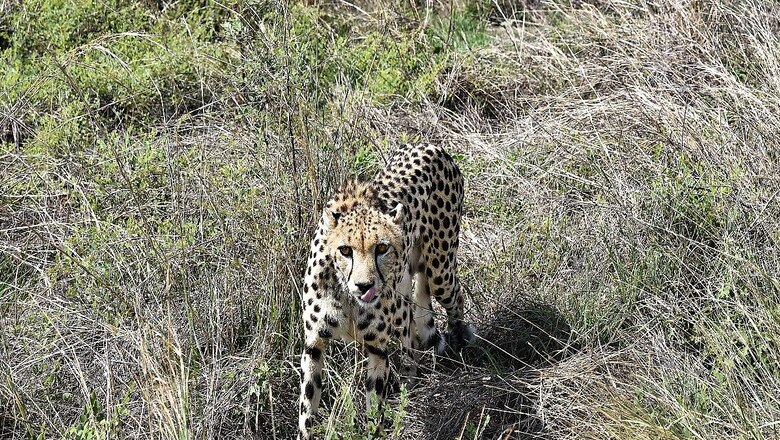
views
A female Cheetah, Dhatri (Tiblisi), among the few brought from Africa, was found dead, said an official release on Wednesday.
A press release giving update on the health of Kuno cheetahs said, “Today [Wednesday] morning one of the female cheetah – Dhatri (Tiblisi) was found dead. To determine the cause of the death, post mortem is being conducted.”
While 14 cheetahs — seven males, six females and one female cub — are kept in the bomas in Kuno, a female cheetah is out in the open and is being intensively monitored by a team. Efforts are on to bring her back to the boma for a health examination, the statement said.
Under the Project Cheetah, a total of 20 radio-collared animals were imported from Namibia and South Africa to the Kuno National Park (KNP) in Madhya Pradesh and later four cubs were born from Namibian cheetah ‘Jwala’. Out of these 24 feline, nine have died, including the latest death. Some cheetahs were reported to have developed infections due to radio collars.
The Ministry of Environment and Forests and the National Tiger Conservation Authority (NTCA) had earlier told the Supreme Court that deaths of five adult cheetahs and three cubs at KNP is troubling but not “unduly alarming”, and the surviving big cats are being captured and medically examined as a precautionary measure.
The joint affidavit, filed on behalf of the environment ministry and NTCA, said the provisional diagnosis of mortality events points towards “natural causes” and none of the cheetahs have died due to unnatural reasons such as poaching, snaring, poisoning, road hits, electrocution etc.
“It is respectfully submitted that the NTCA today has no reason to believe that the mortalities were caused on account of any inherent unsuitability at the Kuno site,” it said.
The affidavit said the general scientific awareness is that being an integral part of the ecosystem, cheetahs in general have very low survival rate of 50 per cent in adults even in non-introduced populations. Non-introduced cheetah populations are essentially native species.
“In the case of introduced population the survival rates are even much lower taking other variables into account which may lead to about 10 per cent survival in cubs, and thus, mortalities (at KNP) though troubling and in need of redressal and curtailment are not unduly alarming,” it said.
















Comments
0 comment